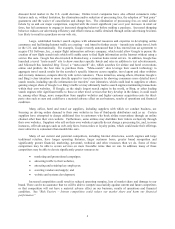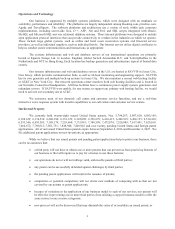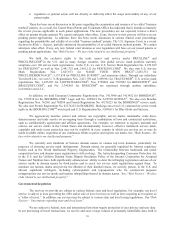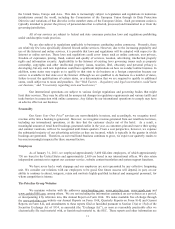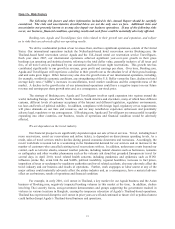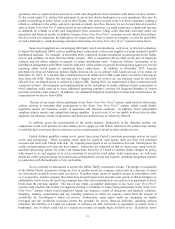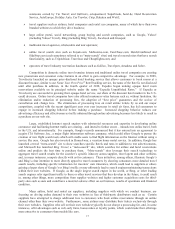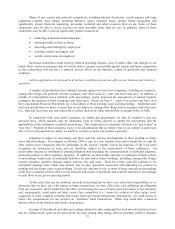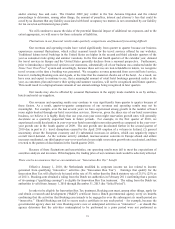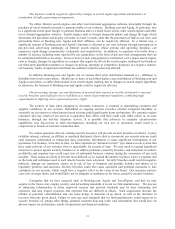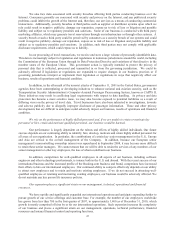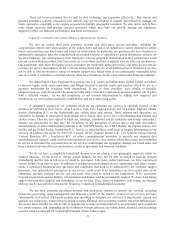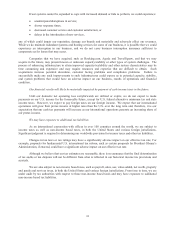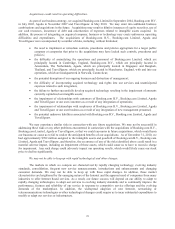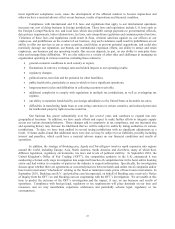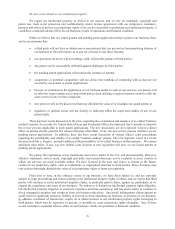Priceline 2010 Annual Report Download - page 92
Download and view the complete annual report
Please find page 92 of the 2010 Priceline annual report below. You can navigate through the pages in the report by either clicking on the pages listed below, or by using the keyword search tool below to find specific information within the annual report.18
Many of our current and potential competitors, including Internet directories, search engines and large
traditional retailers, have longer operating histories, larger customer bases, greater brand recognition and
significantly greater financial, marketing, personnel, technical and other resources than we do. Some of these
competitors may be able to secure services on more favorable terms than we can. In addition, many of these
competitors may be able to devote significantly greater resources to:
x marketing and promotional campaigns;
x attracting traffic to their websites;
x attracting and retaining key employees;
x securing vendors and supply; and
x website and systems development.
Increased competition could result in reduced operating margins, loss of market share and damage to our
brand. There can be no assurance that we will be able to compete successfully against current and future competitors
or that competition will not have a material adverse effect on our business, results of operations and financial
condition.
Adverse application of state and local tax laws could have an adverse effect on our business and results of
operation.
A number of jurisdictions have initiated lawsuits against on-line travel companies, including us, related to,
among other things, the payment of hotel occupancy and other taxes (i.e., state and local sales tax). In addition, a
number of municipalities have initiated audit proceedings, issued proposed tax assessments or started inquiries
relating to the payment of hotel occupancy and other taxes. Please see Item 3 – Legal Proceedings and Note 16 to
the Consolidated Financial Statements for a description of these pending cases and proceedings. Additional state
and local jurisdictions are likely to assert that we are subject to, among other things, hotel occupancy and other taxes
(i.e., state and local sales tax) and could seek to collect such taxes, either retroactively or prospectively, or both.
In connection with some hotel occupancy tax audits and assessments, we may be required to pay any
assessed taxes, which amounts may be substantial, prior to being allowed to contest the assessments and the
applicability of the ordinances in judicial proceedings. This requirement is commonly referred to as “pay to play” or
“pay first.” Payment of these amounts, if any, is not an admission that we believe that we are subject to such taxes
and, even if such payments are made, we intend to continue to assert our position vigorously.
Litigation is subject to uncertainty and there could be adverse developments in these pending or future
cases and proceedings. For example, in October 2009, a jury in a San Antonio class action found that we and the
other online travel companies that are defendants in the lawsuit “control” hotels for purposes of the local hotel
occupancy tax ordinances at issue and are, therefore, subject to the requirements of those ordinances. An
unfavorable outcome or settlement of pending litigation may encourage the commencement of additional litigation,
audit proceedings or other regulatory inquiries. In addition, an unfavorable outcome or settlement of these actions
or proceedings could result in substantial liabilities for past and/or future bookings, including, among other things,
interest, penalties, punitive damages and/or attorney fees and costs. There have been, and will continue to be,
substantial ongoing costs, which may include “pay to play” payments, associated with defending our position in
pending and any future cases or proceedings. An adverse outcome in one or more of these unresolved proceedings
could have a material adverse effect on our business and results of operations and could be material to our earnings
or cash flows in any given operating period.
To the extent that any tax authority succeeds in asserting that we have a tax collection responsibility, or we
determine that we have one, with respect to future transactions, we may collect any such additional tax obligation
from our customers, which would have the effect of increasing the cost of hotel room reservations to our customers
and, consequently, could make our hotel service less competitive (i.e., versus the websites of other online travel
companies or hotel company websites) and reduce hotel reservation transactions; alternatively, we could choose to
reduce the compensation for our services on “merchant” hotel transactions. Either step could have a material
adverse effect on our business and results of operations.
In many of the judicial and other proceedings initiated to date, municipalities seek not only historical taxes
that are claimed to be owed on our gross profit, but also, among other things, interest, penalties, punitive damages


